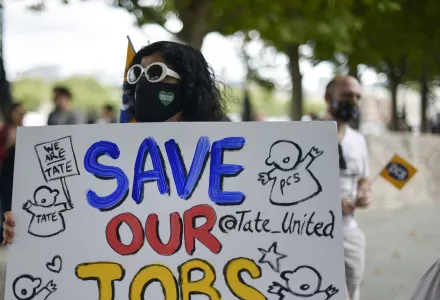Article

Our weekly COVID-19 and Economic Diplomacy tracker looks at policies that impact the coordination of international governments and central banks, ongoing commentary and analysis, and asks what these turbulent times mean for economic diplomacy.
We’d love to hear what you think. Send us your comments, and be sure to follow us on Twitter @BelferEDI.
The Highlights
- The U.S. Department of Labor released its latest jobs report with unemployment falling to 10.2% and the economy adding 1.8 million jobs. President Trump signed four executive orders for coronavirus relief.
- Investor confidence in the eurozone is increasing as the bloc suspended its national budget rule. The UK faces a historic recession, with GDP falling 20.4% in the second quarter, and a jobs crisis, having shed 750,000 jobs and furloughed more than 25% of the workforce since the lockdown.
- Africa recorded 1 million Covid-19 cases last week. However, experts argue that the continent is vastly undercounting and actually surpassed that number many weeks ago.
U.S. Developments
- The Department of Labor released the latest jobs report last week with employers adding 1.8 million jobs and unemployment falling to 10.2 percent. The number of jobs added in July is well below the 4.8 million increase in June signaling weakening momentum given the surge in coronavirus cases. Fewer than half of the 22 million jobs lost in March and April have been restored. Unemployment was 14.6 percent among Black workers; 12.9 percent for Hispanic workers; 12 percent for Asian workers; and 9.2 percent among white workers.
- Though the jobs report counted 16.3 million Americans as unemployed, the Labor Department reported that over 30 million are receiving some sort of unemployment benefit. This discrepancy is due to how the Labor Department defines unemployment compared to state requirements, and the jobs report does not count people as unemployed if they have given up looking for work and are not considered part of the labor force. Harvard Kennedy School professor Jason Furman provides an in-depth analysis of the jobs report and unemployment rate.
- Emma Ockerman writes for Vice that as many as 40 million Americans could face eviction by the end of the year without government assistance and intervention. In a report published by the National Low Income Housing Coalition, researchers found that 30 to 40 million Americans could be at risk for eviction, enveloping anywhere from 29% to 43% of all renter households in the U.S.
- With Congressional and administration leaders failing to reach a deal on economic recovery legislation, President Trump signed four executive actions for coronavirus relief. The four measures consist of a federal eviction ban, payroll tax suspension, relief for student borrowers, and $400/week for the unemployed. However, senior administration officials have since acknowledged that federal unemployment benefits will only guarantee $300/week, a 50 percent reduction from the unemployment benefits previously authorized by Congress that expired in July. The federal government may only have enough money to cover the additional $300 benefits for five weeks; after that, states will have to cover the costs.
- The Federal Reserve released data on its Main Street program, its first ever attempt to provide loans to midsize businesses. The report covered $92.2 million in loans, half of what the program has backed so far. The Fed has been criticized for not acting quickly enough (the program was announced in March but did not purchase its first loan until July 15) as well as for only using a fraction of its $600 billion capacity. More than $600 million in loans are in some stage of approval which equals only 0.1% of the Main Street program’s lending capacity. Bharat Ramamurti, a member of the Congressional Oversight Commission, called the program a “failure.” At that hearing, Federal Reserve Boston President Eric Rosengren stated that he expects the program to pick up with time, especially if the pandemic worsens.
European Developments
- The EU’s national budget rule will remain suspended and will not be enforced again until 2022 at the earliest. The rule, suspended in March, previously obliged countries to work towards the eurozone’s debt and deficit targets. It required a country’s budget deficit to be smaller than 3 percent of GDP and public debt to be lower than 60 percent of GDP.
- In the UK, GDP fell 20.4 percent in the second quarter, posting the steepest decline of any G7 nation and is the biggest drop in quarterly GDP on record for the country. Britain now has the worst economy and highest number of excess Covid-19 deaths in Europe. This marks the UK’s first recession since the 2008 global financial crisis. Though devastating, these figures are not unexpected and next quarter’s figures will be more telling, according to Institute for Fiscal Studies research economist Isabel Stockton. The Bank of England forecasts that the economy will not return to pre-pandemic levels until the end of 2021.
- The UK shed 750,000 jobs and more than a quarter of the workforce is still temporarily away from work since the start of the coronavirus lockdown. A greater number of workers are now at risk of falling into unemployment as the government gradually winds down its job retention scheme. Up to 5 million employees are still on the furlough scheme and an additional 300,000 employees are temporarily off work while receiving no pay. There is mounting pressure that the government extend the furlough scheme beyond its October expiration or, at the very least, institute more measures to support jobs. Jonathan Reynolds, shadow work and pensions secretary, stated that “Britain is in the midst of a jobs crisis.”
- Investor confidence in Germany’s economy surged to its highest levels since January 2004. The Zew survey of financial market experts found investor confidence increased by 12.2 points to a record 71.5 points; this beat economists’ expectations of a slight fall to 58 points. Confidence in the eurozone bloc overall also increased by 4.4 points to reach 64 points. This optimistic sentiment follows the recent trend of Germany seemingly recovering from its lockdown more quickly than other EU countries. However, investors’ assessment of Germany’s current economic climate continues to remain quite low at -81.3.
Emerging Markets
- Though the continent recorded almost 1 million cases last week, the true number of Covid-19 cases in Africa is vastly undercounted. This lack of accurate data is partially due to underreporting of positive tests making it difficult to assess the efficacy of countries’ responses. As evidenced globally, cases seem to be growing more quickly as countries reopen. In an interview with the Financial Times, the South African Reserve Bank governor defended the Bank’s response to the economic fallout of the pandemic, the biggest downturn the country has faced in 90 years.
- Beijing has engaged in “mask diplomacy” in Latin America, home to almost half of the world’s new coronavirus cases. China has donated medical supplies and offered technical help. Private companies such as Alibaba and Huawei have also offered assistance. Foreign Minister Wang Yi, in a virtual video conference with Latin American and Caribbean countries, offered $1 billion in loans to buy a Chinese-made vaccine once it is available and calling for closer relations overall. With more than a dozen countries signed up for the Belt and Road Initiative, this diplomatic effort seems to directly stem from President Xi Jinping, who has telephoned at least six Latin American leaders since the start of the pandemic.
- Former UK Prime Minister Tony Blair writes in the Financial Times that leaders of developing countries should focus on three priorities to respond to the pandemic - protecting healthcare workers and services; public engagement and community action; and building up surge capacity in hospitals.
Odds and Ends
- Megan Greene, a senior fellow at Harvard Kennedy School, argues in the Financial Times that the pandemic offers an opportunity to rethink the labor market to strengthen the U.S. economy.
- Carmen Reinhart and Vincent Reinhart write in Foreign Affairs that the pandemic has caused a massive economic contraction that will be followed by a financial crisis in many parts of the world.
- In a Brookings podcast, David Dollar explores how the pandemic and recession are affecting U.S. trade.
Recommended citation
Suh, Hannah. “This Week in COVID-19 and Economic Diplomacy: ‘U.S. and UK Face Job Crisis’.” August 13, 2020


